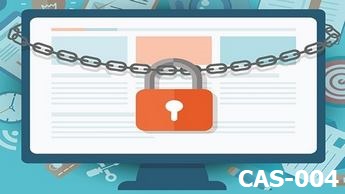Use VCE Exam Simulator to open VCE files

100% Latest & Updated CompTIA PT0-003 Practice Test Questions, Exam Dumps & Verified Answers!
30 Days Free Updates, Instant Download!
PT0-003 Premium Bundle

CompTIA PT0-003 Practice Test Questions, CompTIA PT0-003 Exam Dumps
With Examsnap's complete exam preparation package covering the CompTIA PT0-003 Practice Test Questions and answers, study guide, and video training course are included in the premium bundle. CompTIA PT0-003 Exam Dumps and Practice Test Questions come in the VCE format to provide you with an exam testing environment and boosts your confidence Read More.
The PT0-003 exam, also known as the CompTIA PenTest+ certification, is a widely recognized credential in the cybersecurity industry. It validates the skills necessary for penetration testing, vulnerability assessment, and overall network security evaluation. For IT professionals aiming to specialize in ethical hacking or strengthen their cybersecurity portfolio, the PT0-003 certification provides both credibility and practical knowledge.
With cyber threats increasing daily, organizations are seeking professionals who can identify and mitigate security vulnerabilities before attackers exploit them. The PT0-003 certification equips candidates with the knowledge to conduct thorough penetration tests, understand threat modeling, and implement mitigation strategies. By achieving this credential, candidates signal to employers that they possess a comprehensive understanding of offensive security practices.
The PT0-003 certification exam is structured to evaluate a candidate's ability across several critical domains. It is not solely theoretical; it emphasizes practical skills through scenario-based questions. The exam duration is designed to test both speed and accuracy, reflecting real-world conditions where penetration testers must analyze systems efficiently.
The PT0-003 exam covers areas including planning and scoping a penetration test, performing information gathering and vulnerability identification, managing exploits, and reporting findings effectively. Each domain is weighted according to its relevance in real-world security operations. This structured approach ensures that certified professionals have a well-rounded understanding of the entire penetration testing lifecycle.
Candidates often find that hands-on experience combined with study guides, labs, and practice exams provides the most effective preparation. Practice exams are particularly valuable because they simulate the question types and timing constraints of the actual PT0-003 test. This simulation helps candidates not only assess their knowledge but also develop the ability to think critically under pressure.
The importance of the PT0-003 certification extends beyond the exam itself. In the modern cybersecurity landscape, organizations face increasingly sophisticated threats, from ransomware attacks to insider threats. Professionals certified in penetration testing are positioned to address these challenges proactively.
Employers view the PT0-003 credential as a benchmark for skill and reliability. It demonstrates that the individual can perform comprehensive security assessments, identify vulnerabilities, and recommend mitigation strategies in a structured and ethical manner. This competency is particularly important for companies handling sensitive information, such as financial institutions, healthcare providers, and government agencies.
Moreover, achieving PT0-003 certification enhances career prospects. Professionals can qualify for roles such as penetration tester, vulnerability analyst, ethical hacker, and cybersecurity consultant. Certification often correlates with higher salaries, as it proves a level of expertise that organizations value highly. In many cases, certified professionals also find opportunities for career advancement more readily than their non-certified peers.
Understanding the domains of the PT0-003 exam is critical to effective preparation. Each domain focuses on a set of skills that are essential for a successful penetration tester.
This domain emphasizes the initial phases of a penetration test, including understanding client requirements, defining rules of engagement, and identifying the scope of the assessment. Candidates must demonstrate the ability to plan tests that are thorough yet compliant with legal and organizational constraints.
Effective penetration testing begins with gathering information about the target system. This domain covers reconnaissance techniques, network scanning, and vulnerability assessment. Candidates learn to identify potential attack vectors while distinguishing between false positives and real threats.
After vulnerabilities are identified, candidates are expected to demonstrate how to exploit them safely to assess the impact on the system. This domain also covers post-exploitation activities, including maintaining access and lateral movement, while ensuring that the testing process does not disrupt operations or violate ethical standards.
The final domain emphasizes the ability to document findings and communicate them effectively to stakeholders. Reporting is a critical component of penetration testing, as the results guide organizations in addressing vulnerabilities. Candidates must learn to present technical findings in a clear, actionable manner suitable for both technical and non-technical audiences.
Unlike purely theoretical certifications, the PT0-003 exam places a strong emphasis on practical application. Candidates must be able to demonstrate not only their knowledge but also their ability to apply that knowledge in realistic scenarios. This approach ensures that certified professionals are prepared for the challenges they will encounter in the field.
Hands-on skills are particularly important in areas such as network exploitation, social engineering, and security tool usage. The exam tests a candidate’s ability to think critically and adapt strategies based on evolving conditions. Scenario-based questions are designed to mimic real-life situations, requiring candidates to analyze, make decisions, and provide recommendations effectively.
Practice exams are a key resource for developing these skills. They offer simulated environments where candidates can apply theoretical knowledge, practice problem-solving, and evaluate their readiness for the actual test. Regular practice helps build confidence and familiarity with the types of scenarios that appear on the PT0-003 exam.
Successful preparation for the PT0-003 certification requires a strategic approach. Candidates should combine study materials, hands-on labs, and practice exams to ensure comprehensive coverage of the exam objectives.
One effective strategy is to start with a detailed review of the official syllabus. Understanding the exam objectives allows candidates to allocate study time according to domain weightings, focusing more on areas that carry higher importance in the test. Breaking the preparation into manageable segments helps maintain motivation and ensures systematic coverage of all topics.
In addition to studying theory, engaging in hands-on exercises is critical. Setting up virtual labs or using cloud-based platforms allows candidates to experiment with penetration testing tools, perform scans, and practice exploitation techniques safely. These practical exercises reinforce theoretical knowledge and provide experience in handling real-world challenges.
Practice exams serve as both an assessment and learning tool. By taking multiple simulated exams, candidates can identify weak areas and adjust their study plans accordingly. Review of exam results highlights patterns, such as frequently missed questions or misunderstood concepts, allowing targeted improvement. This approach ensures that candidates enter the PT0-003 exam with both knowledge and practical readiness.
Leveraging community resources can significantly enhance preparation. Certified professionals, study groups, and online forums provide valuable insights into exam strategies, common pitfalls, and tips for success. Many candidates contribute real-world experiences and sample questions, offering perspectives that go beyond textbooks.
Additionally, guidance from experienced cybersecurity experts helps candidates understand the rationale behind various penetration testing methodologies. These mentors often provide scenario-based examples, demonstrating how to approach complex security problems in practical settings. Engaging with a community of learners also fosters accountability, as participants share progress, challenges, and solutions.
Achieving PT0-003 certification is more than a personal milestone; it has tangible career benefits. Organizations increasingly seek certified professionals to protect critical assets and ensure regulatory compliance. Certified penetration testers are trusted to evaluate systems objectively and provide actionable recommendations that enhance overall security posture.
The credential can open doors to specialized roles such as security analyst, penetration tester, ethical hacker, and cybersecurity consultant. Many employers also offer increased responsibilities and leadership opportunities to certified staff, recognizing their expertise in managing security risks effectively.
Additionally, the certification can serve as a foundation for advanced credentials in cybersecurity. Professionals often pursue further training in areas such as advanced penetration testing, threat hunting, and incident response. The PT0-003 exam lays the groundwork for this progression, equipping candidates with the core skills necessary for advanced study and specialization.
Practice exams play a pivotal role in preparing for the PT0-003 certification. They not only familiarize candidates with question formats and timing but also reinforce learning through repetition and application. Taking practice tests under timed conditions helps simulate the pressure of the real exam, improving decision-making speed and accuracy.
These exams often include scenario-based questions, which are essential for understanding how to approach complex penetration testing challenges. Reviewing practice exam results allows candidates to identify patterns in mistakes, focus on weaker domains, and refine their strategies.
By combining study materials, hands-on labs, and practice exams, candidates can approach the PT0-003 exam with confidence. The combination ensures both theoretical knowledge and practical skills are thoroughly developed, resulting in a higher likelihood of success.
Preparing for the PT0-003 exam requires more than memorizing information. The CompTIA PenTest+ certification evaluates practical skills, scenario-based problem solving, and theoretical knowledge. A well-structured study strategy is essential to cover all exam objectives efficiently while building the confidence needed to succeed.
The PT0-003 certification assesses candidates across multiple domains, including planning and scoping, vulnerability assessment, exploitation, post-exploitation, and reporting. Each domain demands a combination of technical knowledge and hands-on proficiency. Without a strategic approach, candidates risk underestimating areas of difficulty or overemphasizing familiar topics.
Before diving into study materials, it is crucial to define clear, achievable goals. Candidates should establish a timeline based on their availability, prior knowledge, and exam date. Breaking the preparation into weekly or monthly objectives helps maintain focus and ensures consistent progress.
Study goals should also be specific to each exam domain. For example, a candidate may plan to dedicate one week to mastering vulnerability scanning tools, another week to practice exploitation techniques, and additional time to reporting methodologies. This structured approach ensures that no domain is neglected and that practice remains purposeful.
Documenting goals is an effective way to track progress. Maintaining a study journal or planner allows candidates to note completed tasks, areas of difficulty, and insights gained during practice. This habit also supports long-term retention and helps reduce exam anxiety by creating a sense of preparedness.
A critical element of study strategy is understanding the exam domains in detail. Candidates should review the official CompTIA PenTest+ syllabus and become familiar with the weightings of each domain. This information guides study time allocation, ensuring that high-weight domains receive appropriate attention.
This domain focuses on the initial steps of a penetration test, including understanding the client’s requirements, establishing rules of engagement, and defining the scope. Candidates should study project planning techniques, legal considerations, and risk assessment methodologies. Practice scenarios that simulate real-world scoping exercises help reinforce these concepts.
Effective reconnaissance forms the foundation of successful penetration testing. Candidates need to understand methods for passive and active information gathering, network mapping, and vulnerability scanning. Hands-on experience with tools like Nmap, Nessus, or OpenVAS is essential. Practice exercises that mimic real network environments help candidates recognize potential threats and distinguish between false positives and genuine vulnerabilities.
Once vulnerabilities are identified, candidates must demonstrate the ability to exploit them safely. This domain covers exploitation techniques, privilege escalation, and maintaining access for testing purposes. Scenario-based practice is crucial here, as candidates must evaluate potential impact and determine appropriate remediation steps. Post-exploitation exercises emphasize ethical conduct, ensuring that testing does not compromise system stability or violate regulations.
The final domain emphasizes effective documentation and communication of findings. Candidates should focus on writing clear, actionable reports and presenting results to both technical and non-technical stakeholders. Practicing the creation of reports for simulated scenarios helps candidates develop concise communication skills while reinforcing technical understanding.
A balanced study strategy incorporates both theoretical knowledge and hands-on practice. Reading official study guides, reviewing exam objectives, and understanding methodologies provide the foundational knowledge needed to succeed. However, without practical application, candidates may struggle with scenario-based questions on the PT0-003 exam.
Hands-on labs allow candidates to test theoretical concepts in controlled environments. These exercises often involve setting up virtual networks, deploying vulnerabilities, and practicing exploitation techniques safely. Repetition of these exercises builds familiarity with tools, improves problem-solving speed, and reinforces best practices.
Practice exams play a central role in combining theory and practical skills. By simulating the actual PT0-003 test conditions, candidates can identify knowledge gaps, test time management, and refine decision-making processes. Repeated practice strengthens confidence and reduces anxiety during the real exam.
Effective time management is critical for both preparation and the actual PT0-003 exam. Candidates should allocate study sessions based on domain difficulty, personal strengths, and available time. Using techniques like the Pomodoro method or timed study blocks can improve focus and productivity.
During practice exams, candidates should simulate timed conditions to develop pacing strategies. Understanding how much time to spend on multiple-choice questions versus scenario-based exercises helps optimize performance. Reviewing incorrectly answered questions afterward is equally important, as it reinforces learning and ensures mistakes are not repeated.
A wide variety of study resources are available for PT0-003 preparation. Official CompTIA study guides provide structured coverage of exam objectives, while online tutorials and video courses offer visual explanations of complex concepts. Hands-on labs, both virtual and in-person, provide practical experience critical for scenario-based questions.
Community resources also offer significant value. Online forums, study groups, and discussion boards allow candidates to share insights, ask questions, and explore real-world applications of penetration testing techniques. Engaging with a community of peers and experts creates a collaborative learning environment, often leading to deeper understanding and improved retention.
Monitoring progress is an essential component of a successful study strategy. Candidates should regularly assess their understanding of each exam domain, identifying areas of weakness for additional focus. Practice exams, lab exercises, and self-assessment quizzes provide measurable indicators of readiness.
Adjusting study strategies based on progress ensures that preparation remains efficient. For instance, if a candidate consistently struggles with exploitation techniques, additional lab practice and review of relevant theory can address gaps. Similarly, if a particular domain shows strong performance, study time can be reallocated to weaker areas.
Scenario-based learning is a vital component of PT0-003 preparation. The exam often presents candidates with realistic situations that require critical thinking, technical proficiency, and decision-making skills. Practicing with simulated scenarios prepares candidates to apply knowledge in practical contexts, reinforcing both technical and soft skills.
Creating custom scenarios or using pre-built labs allows candidates to practice problem-solving under realistic conditions. For example, simulating a network with multiple vulnerabilities requires identification, exploitation, and documentation. This type of hands-on experience closely mirrors real-world penetration testing and prepares candidates for the complex challenges presented in the exam.
Even well-prepared candidates can make mistakes during PT0-003 preparation. Common pitfalls include focusing solely on theory, neglecting practical skills, or underestimating time management challenges. Another frequent mistake is relying exclusively on outdated resources or exam dumps, which may not reflect current exam objectives or scenario-based questions.
To avoid these pitfalls, candidates should maintain a balanced approach that incorporates theory, hands-on practice, and regular practice exams. Updating study materials with insights from certified professionals or recent exam takers ensures preparation aligns with current standards. Regularly reviewing progress and adjusting study strategies also minimizes the risk of neglecting weak areas.
Practice exams are a cornerstone of PT0-003 preparation. They provide multiple benefits, including familiarization with question formats, timing, and the difficulty level of the real exam. By practicing under simulated conditions, candidates develop confidence in their abilities to analyze scenarios, make informed decisions, and answer questions accurately.
Reviewing practice exam results helps candidates understand their strengths and weaknesses. Areas of weakness can be addressed with targeted study, while strong areas can be reinforced through continued practice. This iterative approach ensures a well-rounded preparation that balances knowledge, skills, and confidence.
The most effective PT0-003 preparation strategies combine multiple study methods. Candidates should integrate reading, hands-on labs, practice exams, and scenario-based exercises into a cohesive plan. This approach ensures that all learning styles are addressed, from visual and auditory learners to those who retain knowledge best through active participation.
Regular practice, review, and adjustment of study methods create a continuous learning cycle. As candidates progress, they gain both technical expertise and the confidence necessary to tackle the full scope of the PT0-003 exam.
Support from community members and cybersecurity experts enhances preparation significantly. Experienced professionals offer practical tips, share insights on common challenges, and provide guidance on complex topics. Engaging in study groups or online forums allows candidates to compare approaches, discuss strategies, and gain exposure to diverse perspectives.
Mentorship from certified professionals can also accelerate learning. Experts often provide scenario-based exercises, demonstrate effective use of tools, and highlight areas frequently tested on the PT0-003 exam. This guidance helps candidates optimize their preparation and approach the exam strategically.
PT0-003 preparation extends beyond passing the exam. The skills and knowledge gained through structured study, hands-on practice, and scenario-based exercises are directly applicable to real-world cybersecurity work. Candidates who approach preparation strategically not only achieve certification but also develop capabilities that enhance career prospects and professional performance.
The combination of theoretical understanding, practical experience, and practice exam exposure ensures that certified professionals are prepared to handle the challenges of penetration testing, vulnerability assessment, and security reporting. This foundation supports ongoing learning and provides a platform for future specialization in advanced cybersecurity domains.
One of the most effective ways to prepare for the PT0-003 exam is through consistent and focused practice exams. While study guides, labs, and theory provide essential knowledge, practice exams simulate real-world testing conditions, helping candidates refine their skills and assess their readiness. CompTIA PenTest+ practice exams are particularly valuable because they mirror the complexity, timing, and scenario-based nature of the actual certification test.
Practice exams provide more than a simple review of topics. They test a candidate’s ability to apply knowledge under pressure, identify vulnerabilities, and analyze security scenarios. By using practice exams strategically, candidates can improve both their technical proficiency and confidence, which is critical for passing the PT0-003 exam.
The PT0-003 exam emphasizes practical skills and scenario-based questions. As a result, traditional study methods alone may not be sufficient. Practice exams offer a dynamic approach to preparation, combining time management, technical knowledge, and problem-solving in a simulated environment.
Practice exams help candidates identify areas of strength and weakness. By completing timed tests and reviewing the results, candidates can see which topics require additional study and which skills are already strong. This feedback loop is essential for creating a focused study plan, ensuring that every minute of preparation contributes to success.
Additionally, practice exams familiarize candidates with the structure and format of the PT0-003 exam. Understanding the types of questions, the order in which they appear, and the level of difficulty reduces anxiety and improves performance on test day. Familiarity with the exam environment also encourages more effective time management, a critical factor in passing the certification.
Before attempting a practice exam, candidates should ensure that they have covered the foundational concepts of each domain. This preparation includes understanding planning and scoping methodologies, information gathering techniques, vulnerability assessment tools, exploitation processes, post-exploitation activities, and reporting standards.
Setting a study schedule that includes dedicated practice exam sessions allows candidates to evaluate their understanding consistently. Initially, untimed practice exams can help learners focus on accuracy and comprehension. As readiness improves, transitioning to timed simulations mimics the real PT0-003 experience, helping candidates build speed and efficiency.
To maximize the effectiveness of practice exams, it is important to simulate actual PT0-003 exam conditions. Candidates should take exams in a quiet environment, free from distractions, and adhere strictly to the time limits. This approach replicates the pressure and pacing of the real test, training candidates to manage their time efficiently.
Simulating exam conditions also involves practicing with scenario-based questions. These questions test the ability to apply knowledge in practical situations, such as identifying vulnerabilities, exploiting weaknesses safely, or documenting findings for stakeholders. Engaging with realistic scenarios builds problem-solving skills and prepares candidates for the types of decisions required in professional penetration testing.
One of the key benefits of practice exams is the ability to review and analyze results. After completing a practice test, candidates should carefully examine incorrect answers to understand why they were wrong. This analysis helps identify gaps in knowledge and reinforces learning by encouraging deeper investigation into misunderstood concepts.
Exam results also reveal patterns, such as recurring mistakes in specific domains or question types. By recognizing these patterns, candidates can adjust their study strategies to target weak areas. For example, if a candidate consistently struggles with exploitation scenarios, additional hands-on lab exercises can improve proficiency.
Identifying weak areas is only the first step; targeted practice is essential for improvement. Candidates should create a study plan that allocates more time to domains or topics where performance is low. This may involve reviewing theory, completing lab exercises, or attempting additional practice questions focused on those areas.
For example, if information gathering and reconnaissance are consistently challenging, candidates can practice using network scanning tools, simulate reconnaissance exercises, and review methodologies for identifying potential attack vectors. Targeted practice ensures that preparation is efficient and effective, focusing on areas that will have the greatest impact on exam performance.
Scenario-based questions are a core component of the PT0-003 exam. Unlike multiple-choice questions that test memory or recognition, scenario questions require critical thinking and application of knowledge. Practice exams that include realistic scenarios allow candidates to develop strategies for identifying, exploiting, and reporting vulnerabilities.
Working through these scenarios helps candidates learn to prioritize tasks, assess risks, and determine the most effective approach in complex situations. Scenario-based practice also reinforces soft skills such as analytical reasoning, decision-making under pressure, and effective communication of findings. These skills are essential not only for the exam but also for professional penetration testing roles.
Time management is a crucial skill for passing the PT0-003 exam. Practice exams provide an opportunity to develop and refine these skills. By tracking the time spent on each question or scenario, candidates can identify areas where they may be working too slowly and adjust accordingly.
Timed practice exams encourage candidates to balance speed with accuracy. It is important to avoid spending too much time on a single question while ensuring that answers are thoughtfully considered. Developing an internal pacing strategy allows candidates to complete all questions within the allocated time and reduces the risk of rushing at the end of the exam.
Repeated practice is key to mastering the skills needed for PT0-003 certification. Each practice exam reinforces knowledge, improves familiarity with exam formats, and builds confidence. Over time, candidates begin to recognize common question patterns, develop problem-solving strategies, and improve their technical efficiency.
Repetition also helps strengthen memory retention. By repeatedly encountering similar scenarios, candidates internalize methodologies and tools, which allows them to respond quickly and accurately during the actual exam. This combination of repetition and review enhances both theoretical understanding and practical competence.
CompTIA PenTest+ practice exams benefit from updated question banks, reflecting changes in the exam objectives and current cybersecurity trends. Using updated questions ensures that candidates are studying relevant material and preparing for the types of challenges currently emphasized in the PT0-003 exam.
Updated practice exams often include scenarios that mirror recent vulnerabilities, attack techniques, or industry best practices. This exposure prepares candidates for questions that test both knowledge and real-world application, reinforcing the connection between exam preparation and professional competency.
Confidence is a significant factor in exam performance. Practice exams allow candidates to build confidence by providing repeated exposure to question formats, timing pressures, and scenario-based challenges. As candidates complete more practice tests and improve their results, they develop a sense of readiness that reduces anxiety and improves focus on exam day.
Confidence also comes from familiarity with tools, methodologies, and reporting practices. Candidates who regularly engage with realistic practice exams gain hands-on experience, which translates into greater assurance in their ability to perform under test conditions and in professional environments.
Maintaining a record of practice exam results helps candidates track progress over time. By reviewing trends in scores, identifying persistent weaknesses, and noting areas of improvement, candidates can make informed decisions about study priorities.
Progress tracking also provides motivation. Seeing measurable improvement reinforces the effectiveness of the study strategy and encourages continued effort. This iterative process ensures that preparation is adaptive, addressing weaknesses while reinforcing strengths.
Practice exams should be integrated into a broader study strategy. They complement theoretical study, hands-on lab work, and scenario-based learning, providing a holistic approach to PT0-003 preparation. Candidates should alternate between study sessions, lab exercises, and practice tests to reinforce learning from multiple angles.
A comprehensive approach ensures that candidates are not only familiar with exam content but also capable of applying knowledge in realistic contexts. By combining various methods, candidates maximize their preparation efficiency and increase the likelihood of success on the certification exam.
Even with extensive practice, candidates can make mistakes that limit the effectiveness of practice exams. One common mistake is treating practice exams as purely evaluative, rather than as learning opportunities. Reviewing results thoroughly and understanding the rationale behind correct and incorrect answers is essential.
Another mistake is neglecting timing. Candidates may rush through questions or spend too long on a single scenario, which can distort results and reduce the benefit of the exercise. Simulating timed conditions and analyzing time allocation ensures that practice exams accurately reflect real test conditions.
Some candidates rely solely on outdated or unverified practice questions. This approach can lead to gaps in knowledge or familiarity with obsolete scenarios. Using updated practice exams and verified question banks ensures that preparation aligns with the current PT0-003 exam objectives and reflects industry best practices.
Practice exams do more than test knowledge—they reinforce practical skills essential for penetration testing. Candidates often encounter scenarios that require tool usage, vulnerability analysis, and report writing. By repeatedly practicing these tasks, candidates develop muscle memory and procedural understanding that improve efficiency and accuracy.
For example, practice exams may require scanning a network for vulnerabilities, analyzing results, exploiting weaknesses safely, and documenting findings. Engaging with these tasks repeatedly ensures that candidates are prepared for similar challenges on the actual PT0-003 exam and in professional penetration testing environments.
The most effective use of practice exams involves continuous iteration. Candidates should complete a practice test, review results, focus on weak areas, and then repeat the process. This cycle builds mastery over time, reinforcing knowledge, improving technical skills, and increasing confidence.
Iteration also allows candidates to experiment with different strategies for answering scenario-based questions. By analyzing what works best under timed conditions, candidates can refine their approach, optimize performance, and develop problem-solving techniques that transfer to real-world penetration testing.
Preparing for the PT0-003 exam can be both rewarding and demanding. CompTIA PenTest+ certification evaluates a candidate’s ability to perform practical penetration testing, assess vulnerabilities, and communicate findings effectively. While study materials and practice exams provide valuable preparation, candidates often face challenges that can hinder progress if not addressed strategically. Understanding these challenges and implementing solutions is key to achieving success on the PT0-003 exam.
Many candidates encounter similar obstacles during PT0-003 preparation. Recognizing these challenges early allows candidates to take proactive steps to overcome them. Common difficulties include time management, mastering practical skills, understanding scenario-based questions, maintaining motivation, and managing exam anxiety.
Time management is critical because the PT0-003 exam requires both depth of knowledge and the ability to respond under timed conditions. Candidates may struggle to balance studying multiple domains, completing hands-on labs, and taking practice exams. Without careful planning, preparation can become disorganized, leading to stress and incomplete coverage of essential topics.
Mastering practical skills is another frequent challenge. The PT0-003 exam emphasizes hands-on tasks such as network scanning, exploitation, post-exploitation activities, and reporting. Candidates who focus primarily on theory may struggle to apply knowledge in real-world scenarios or timed practice exams.
Scenario-based questions can also present difficulties. Unlike traditional multiple-choice questions, these scenarios require critical thinking, problem-solving, and the ability to integrate knowledge from multiple domains. Candidates must analyze complex situations, prioritize actions, and make decisions that mirror professional penetration testing practices.
Maintaining motivation over an extended preparation period can be challenging, especially when topics are complex or progress seems slow. Candidates may feel overwhelmed or frustrated, which can lead to reduced study consistency. Exam anxiety further complicates preparation, potentially impacting focus and confidence during both practice exams and the actual PT0-003 test.
A structured study plan is essential for overcoming preparation challenges. Candidates should allocate time based on the weightings of PT0-003 exam domains, ensuring that high-priority areas receive sufficient attention. Planning study sessions in advance, including designated time for practice exams and hands-on labs, helps maintain consistency and reduces last-minute stress.
Breaking preparation into smaller, manageable tasks is also effective. For example, candidates can focus on one domain per week, gradually building expertise and reinforcing knowledge. This incremental approach prevents burnout and ensures comprehensive coverage of all exam objectives.
Regularly reviewing progress is critical. Candidates should evaluate their understanding of each domain, assess performance in practice exams, and adjust study plans based on results. Iterative review ensures that weak areas are addressed while strong areas are reinforced, creating a balanced preparation strategy.
Hands-on skills are at the core of PT0-003 preparation. Candidates must be proficient in using penetration testing tools, identifying vulnerabilities, exploiting weaknesses safely, and documenting findings. Enhancing these skills requires deliberate practice in controlled environments such as virtual labs, cloud platforms, or dedicated test networks.
Candidates should simulate realistic scenarios that replicate professional penetration testing tasks. This includes network reconnaissance, vulnerability scanning, exploiting misconfigurations, and analyzing results. Repetition of these exercises builds familiarity with tools, improves technical efficiency, and reinforces best practices for ethical testing.
In addition to tools and techniques, candidates must practice documenting findings effectively. Reporting is a critical component of the exam and professional practice. Creating clear, actionable reports for both technical and non-technical audiences ensures that identified vulnerabilities are understood and addressed.
Scenario-based questions are designed to test a candidate’s ability to integrate knowledge across multiple domains. To master these questions, candidates should practice analyzing complex situations, identifying key information, and determining appropriate actions.
One effective approach is to break scenarios into smaller components. For example, candidates can identify assets, assess potential threats, evaluate vulnerabilities, and prioritize actions. Developing a structured approach ensures that candidates respond methodically and reduces the risk of overlooking critical details.
Practicing multiple scenario-based questions improves analytical thinking and decision-making skills. Candidates learn to recognize patterns, anticipate potential outcomes, and make informed recommendations. This approach enhances readiness for both the PT0-003 exam and real-world penetration testing challenges.
Effective time management is essential for both study sessions and practice exams. Candidates should allocate specific blocks of time for reading, hands-on practice, and completing practice exams. This disciplined approach ensures that each domain receives adequate attention and prevents last-minute cramming.
During practice exams, candidates should simulate timed conditions to develop pacing strategies. Understanding how much time to spend on each type of question or scenario helps ensure completion within the allocated exam duration. Reviewing timing after each practice test allows candidates to refine strategies and improve efficiency.
Using tools such as study planners, calendars, or task management applications can help candidates organize study schedules, track progress, and maintain consistency. Structured planning reduces stress, provides clarity, and enhances overall preparation effectiveness.
Sustaining motivation is a common challenge during PT0-003 preparation. Long study periods, complex topics, and repeated practice exams can lead to fatigue or frustration. To maintain motivation, candidates should set achievable milestones, celebrate small successes, and track progress over time.
Engaging with study groups or online communities can also boost motivation. Sharing experiences, discussing challenges, and collaborating on problem-solving creates a supportive environment that encourages consistent effort. Mentorship from certified professionals provides additional guidance, helping candidates stay focused and confident.
Incorporating variety into study routines is another effective strategy. Alternating between reading, labs, practice exams, and scenario analysis keeps preparation engaging and reinforces learning from multiple angles.
Exam anxiety can negatively impact performance, even for well-prepared candidates. Managing anxiety involves both preparation and psychological strategies. Familiarity with exam format, timing, and question types reduces uncertainty and builds confidence.
Practicing under simulated conditions helps candidates acclimate to the pressure of the real PT0-003 exam. Additionally, relaxation techniques, deep breathing exercises, and mindfulness practices can improve focus and reduce stress during both preparation and the actual test.
Visualizing success and approaching the exam with a positive mindset also enhances performance. Candidates who focus on their preparation and skill mastery are better equipped to handle challenges calmly and make informed decisions under pressure.
Engaging with a community of learners and cybersecurity experts is invaluable for overcoming preparation challenges. Study groups, forums, and mentorship programs provide insights, alternative perspectives, and practical tips. Candidates can ask questions, review complex scenarios, and learn from the experiences of others who have successfully completed the PT0-003 exam.
Expert guidance helps candidates focus on essential topics, avoid common mistakes, and refine practical skills. Professionals may share scenario-based exercises, demonstrate tool usage, and provide strategies for effective reporting. This support accelerates learning and ensures preparation aligns with current exam objectives and industry best practices.
Flexibility in study strategies is critical for overcoming challenges. Candidates should regularly evaluate the effectiveness of their approach and make adjustments as needed. For example, if a particular study method does not improve understanding of a domain, candidates may incorporate additional resources, labs, or practice exams.
Adapting strategies also involves responding to feedback from practice exams. Persistent mistakes or low scores in specific areas indicate the need for targeted study. By iteratively refining preparation methods, candidates maximize efficiency and ensure comprehensive coverage of all PT0-003 domains.
Resilience and persistence are essential traits for PT0-003 success. Preparing for a certification exam can be demanding, and setbacks may occur along the way. Candidates who maintain a consistent study routine, address challenges proactively, and view mistakes as learning opportunities are more likely to succeed.
Practicing problem-solving, managing time effectively, and engaging with community resources build both knowledge and mental resilience. Candidates who approach preparation with determination and a growth mindset develop the skills and confidence necessary to pass the PT0-003 exam and apply their expertise in professional settings.
Overcoming preparation challenges requires an integrated approach that combines study, practice, and review. Candidates should alternate between theory, hands-on labs, and practice exams, reinforcing learning from multiple angles. Reviewing results, analyzing mistakes, and refining strategies ensures continuous improvement.
Integration also involves connecting practical skills to theoretical knowledge. Candidates who understand how concepts apply in real-world scenarios are better prepared for scenario-based questions and professional penetration testing tasks. This holistic approach strengthens readiness for both the PT0-003 exam and future career opportunities.
PT0-003 preparation is not static. Candidates benefit from continuously learning, practicing, and adapting strategies based on evolving needs. Cybersecurity threats, tools, and best practices change rapidly, and preparation must reflect current trends and methodologies.
Regularly updating study materials, engaging with recent practice exams, and incorporating new tools into labs ensures that preparation remains relevant. Continuous learning builds technical proficiency, reinforces knowledge, and enhances the ability to apply skills effectively under exam conditions and in professional environments.
Targeted practice is key to overcoming persistent challenges. Candidates should focus on weak areas identified through self-assessment, practice exams, or lab exercises. This targeted approach allows for efficient use of study time and ensures that no domain is neglected.
For example, if a candidate struggles with exploitation techniques, focused lab sessions and scenario-based exercises improve competency. Similarly, difficulty in reporting and communication can be addressed through repeated practice in creating clear and actionable documentation.
Achieving the PT0-003 certification opens doors to numerous professional opportunities in cybersecurity. The CompTIA PenTest+ credential is recognized globally as a validation of both practical skills and theoretical knowledge in penetration testing, vulnerability assessment, and ethical hacking. Professionals who earn this certification not only enhance their technical expertise but also gain credibility in the eyes of employers, colleagues, and clients.
Understanding how to leverage PT0-003 certification effectively can significantly impact career trajectory, salary potential, and professional growth. This includes aligning certification with relevant roles, continuing skill development, and demonstrating expertise through scenario-based problem solving and real-world application.
The PT0-003 certification qualifies professionals for a range of roles in cybersecurity. These positions often require hands-on experience in penetration testing, vulnerability management, and security analysis. Common career paths include penetration tester, ethical hacker, vulnerability analyst, cybersecurity consultant, and security analyst.
Penetration testers are responsible for identifying weaknesses in systems, networks, and applications before malicious actors can exploit them. Ethical hackers often work within organizations or as consultants to simulate attack scenarios and recommend mitigation strategies. Vulnerability analysts focus on identifying, categorizing, and prioritizing security vulnerabilities, while security consultants provide broader guidance on improving organizational security posture.
Certified professionals are also eligible for leadership roles, such as security team lead or cybersecurity project manager. In these positions, PT0-003 certification demonstrates both technical expertise and the ability to oversee complex security operations, including penetration testing projects and risk assessments.
Obtaining PT0-003 certification enhances professional credibility. Employers recognize that certified candidates have demonstrated competence in key areas such as planning and scoping, information gathering, exploitation, post-exploitation, and reporting. Certification provides a measurable benchmark that distinguishes candidates from those without formal validation of skills.
This credibility extends beyond employers to clients and colleagues. Professionals who hold PT0-003 certification are often trusted to handle sensitive data, conduct security assessments ethically, and provide actionable recommendations. This trust is critical in building long-term career relationships and advancing in the cybersecurity field.
Certification often correlates with higher salary potential. Professionals who earn PT0-003 demonstrate advanced knowledge and practical expertise, which are highly valued by employers. According to industry surveys, certified penetration testers and ethical hackers tend to earn more than their non-certified peers.
Career advancement is also influenced by certification. PT0-003 provides a foundation for promotions, specialized roles, and project leadership opportunities. Professionals can leverage the credential to negotiate higher compensation, take on more responsibility, or transition into specialized areas such as red teaming, threat hunting, or incident response.
The practical skills developed during PT0-003 preparation are directly applicable to professional work. Candidates learn to conduct penetration tests, identify vulnerabilities, exploit weaknesses safely, and document findings effectively. These abilities are essential for real-world cybersecurity tasks and provide immediate value to employers.
Scenario-based practice, integrated into PT0-003 preparation, enhances problem-solving skills. Candidates learn to analyze complex security situations, prioritize risks, and develop actionable recommendations. This experience translates seamlessly to professional environments, where the ability to assess threats and implement mitigation strategies is critical.
Certified professionals can leverage PT0-003 certification to build a professional portfolio. This portfolio may include documented penetration tests, vulnerability assessments, and scenario-based projects completed during preparation or professional work. Demonstrating practical skills alongside certification provides tangible evidence of expertise to potential employers.
A well-organized portfolio showcases both technical knowledge and analytical capabilities. Including detailed reports, tool usage examples, and case studies highlights the candidate’s ability to approach complex security challenges systematically. Portfolios are particularly valuable when seeking consulting opportunities or freelance penetration testing projects.
PT0-003 certification serves as a foundation for continuous learning and skill enhancement. Cybersecurity is a rapidly evolving field, and professionals must stay current with emerging threats, tools, and methodologies. Earning PT0-003 provides a framework for advanced study in areas such as advanced penetration testing, threat intelligence, and security architecture.
Engaging in ongoing education ensures that certified professionals maintain relevance and expertise. Online courses, workshops, webinars, and industry conferences provide opportunities to learn about new attack techniques, defense strategies, and regulatory requirements. Continued skill development reinforces the value of PT0-003 certification and supports long-term career growth.
Certification also facilitates networking and engagement with the cybersecurity community. Professionals can connect with peers, mentors, and experts through forums, conferences, and professional associations. These connections provide opportunities to share knowledge, collaborate on projects, and access job opportunities.
Active participation in the cybersecurity community demonstrates commitment to the field and enhances professional visibility. Professionals who engage with others through mentorship, speaking engagements, or collaborative projects often gain recognition and credibility, further leveraging the PT0-003 certification in their career development.
PT0-003 certification is valuable for individuals transitioning into cybersecurity from other IT domains. Professionals with experience in network administration, systems engineering, or IT support can leverage the credential to demonstrate proficiency in penetration testing and ethical hacking.
By showcasing practical skills, scenario-based problem-solving abilities, and formal certification, candidates can position themselves for roles that may have previously required more specialized experience. This transition expands career options and provides a clear pathway for advancement in the cybersecurity field.
The PT0-003 exam emphasizes analytical thinking, risk assessment, and problem-solving in realistic scenarios. Certified professionals develop the ability to identify security weaknesses, evaluate potential impacts, and prioritize mitigation efforts.
These analytical skills extend beyond penetration testing to broader cybersecurity and IT operations. Professionals can apply these competencies in incident response, threat hunting, security architecture, and policy development. The ability to think critically and solve complex problems enhances both individual performance and organizational security.
PT0-003 certification can also support leadership development. Certified professionals often assume responsibility for managing penetration testing projects, guiding junior staff, and advising organizational leadership on security priorities.
By demonstrating technical expertise and a comprehensive understanding of penetration testing, certified professionals earn trust and respect from peers and supervisors. This foundation supports career advancement into managerial or strategic roles, where decision-making, planning, and oversight are critical.
PT0-003 certification is highly valuable for cybersecurity consultants. Consultants are often required to evaluate multiple client environments, conduct penetration tests, and provide actionable recommendations. Certification signals expertise, professionalism, and reliability, which are essential for securing client trust.
Consulting opportunities also allow professionals to gain exposure to a variety of systems, networks, and organizational environments. This experience broadens skill sets, enhances problem-solving capabilities, and strengthens the practical application of PT0-003 knowledge.
Certified professionals can align their PT0-003 skills with organizational objectives. Companies increasingly recognize the value of penetration testing in identifying vulnerabilities, meeting regulatory requirements, and improving overall security posture.
Professionals can use their certification to advocate for structured security assessments, implement best practices, and guide teams in executing penetration tests effectively. This alignment not only demonstrates value to the organization but also positions the certified professional as a trusted advisor in cybersecurity initiatives.
To maximize the value of PT0-003 certification, professionals should continuously apply their skills in practical settings. Performing penetration tests, conducting vulnerability assessments, and analyzing security scenarios reinforce knowledge and maintain proficiency.
Continuous application ensures that skills remain current and sharp. It also allows certified professionals to adapt to emerging threats, learn new tools, and refine methodologies. This ongoing practice reinforces the foundation built during PT0-003 preparation and enhances career longevity.
PT0-003 certification serves as a stepping stone for advanced cybersecurity credentials. Professionals may pursue certifications in areas such as advanced penetration testing, ethical hacking, red teaming, or threat intelligence.
Building upon PT0-003 knowledge, candidates can specialize in particular domains, gain deeper expertise, and enhance professional value. Advanced certifications complement PT0-003 and open doors to leadership roles, specialized consulting opportunities, and higher compensation.
Finally, PT0-003 certification helps professionals build a reputation for expertise. Certified penetration testers are recognized for their technical proficiency, problem-solving ability, and ethical approach to security assessments.
This reputation can lead to speaking engagements, collaboration on high-profile projects, or mentorship opportunities. By demonstrating competence and professionalism, certified individuals enhance their standing in the cybersecurity community, creating long-term career benefits.
Preparing for the PT0-003: CompTIA PenTest+ exam requires a combination of structured study, hands-on practice, scenario-based learning, and consistent evaluation through practice exams. Each step of preparation, from understanding the exam domains to mastering tools and techniques, contributes to building both knowledge and confidence. Practice exams play a pivotal role in familiarizing candidates with real-world scenarios, enhancing time management, and reinforcing technical and analytical skills.
Overcoming preparation challenges, such as managing time, mastering practical tasks, and tackling complex scenario-based questions, ensures that candidates are ready not only for the exam but also for professional penetration testing roles. A strategic approach that integrates theoretical study, practical exercises, and continuous review allows candidates to address weak areas while reinforcing strengths, ultimately creating a well-rounded preparation experience.
Earning PT0-003 certification opens significant career opportunities in cybersecurity. Certified professionals gain credibility, access to higher-paying roles, and the ability to apply practical skills in real-world environments. Leveraging certification through professional networking, continuous skill development, and portfolio-building further enhances career prospects. PT0-003 also serves as a foundation for advanced certifications, enabling long-term growth in specialized cybersecurity domains.
Ultimately, the PT0-003 certification is more than an exam—it is a pathway to professional development, technical mastery, and career advancement. By approaching preparation with focus, discipline, and practical application, candidates not only succeed in achieving certification but also equip themselves with the skills and expertise necessary to thrive in the dynamic field of cybersecurity.
ExamSnap's CompTIA PT0-003 Practice Test Questions and Exam Dumps, study guide, and video training course are complicated in premium bundle. The Exam Updated are monitored by Industry Leading IT Trainers with over 15 years of experience, CompTIA PT0-003 Exam Dumps and Practice Test Questions cover all the Exam Objectives to make sure you pass your exam easily.
Purchase Individually



CompTIA Training Courses















SPECIAL OFFER: GET 10% OFF
This is ONE TIME OFFER

A confirmation link will be sent to this email address to verify your login. *We value your privacy. We will not rent or sell your email address.
Download Free Demo of VCE Exam Simulator
Experience Avanset VCE Exam Simulator for yourself.
Simply submit your e-mail address below to get started with our interactive software demo of your free trial.